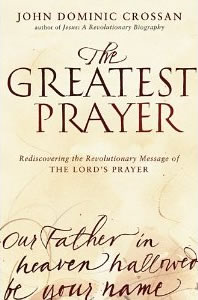Book Notes
 John Dominic Crossan, The Greatest Prayer; Rediscovering the Revolutionary Message of the Lord's Prayer (New York: HarperCollins, 2010), 195pp.
John Dominic Crossan, The Greatest Prayer; Rediscovering the Revolutionary Message of the Lord's Prayer (New York: HarperCollins, 2010), 195pp.
The Lord's Prayer, or the Abba prayer of Jesus, is a "prayer from the heart of Judaism on the lips of Christianity for the conscience of the world." It's nothing less than "a radical manifesto and a hymn of hope for all humanity in language addressed to all the earth." That's true enough, but Crossan loses me in the first few pages of his book with his preconceived theological interpretation of the prayer. Whereas most people think of "justice" as retributive punishment, Crossan says that "distributive" justice, or the fair and equitable distribution of all good things to all humanity, is the sum and substance of the prayer. He calls this "Enoughism." I agree that this is part of the gospel message, but I question whether that's the meaning of the Lord's Prayer.
Many of Crossan's readings are strained to fit this template of non-violent and distributive justice, like his insistence that "lead us not into temptation" means "keep us from responding to Rome's violent domination with our own retaliatory violence." That is, we're not praying about violence against us but violence by us. His interpretation that Jesus separated from John the Baptist (rather than joined his movement) was new to me. His categorical rejection of substitutionary atonement felt stale, and it ignored texts like Isaiah 53 and 1 Peter 2:24. He seems to empty "thy kingdom come" from any divine imminence now or future consummation later; for him the kingdom of God is about human collaboration today, not divine intervention either now or later (which ignores Romans 8). Is it different from a social, economic or political program?
Nonetheless, Crossan is a leading biblical scholar today, and it's a pleasure to read a book by him that's intended for a general audience rather than for technical specialists. The form of the Lord's Prayer is poetic parallelism. The first three petitions concern the character of God — his name, his kingdom, and his will. The last three petitions focus on humanity — our daily bread, our debts, and temptation. Crossan is especially helpful when he digresses into the Greco-Roman context of the biblical literature, or Old Testament backgrounds and connections. I enjoyed how he connected the Lord's Prayer with Paul's classic passage on prayer in Romans 8 ("we don't know how to pray"). If this book helps you to prayer the Abba prayer, then it will have been well worth reading.


